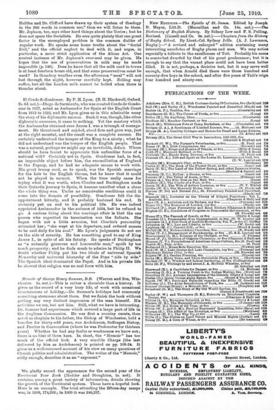El Conde de Gondomar. By F. H. Lyon. (B. H.
Blackwell, Oxford. 2s. 6d. net.)—Diego de Sarmiento, who was created Conde de Gondo- mar in 1617, acted as Ambassador for Spain at the English Court from 1613 to 1622, and Mr. Lyon gives us in this admirable essay the story of his diplomatic success. Such it was, though, like other diplomatic successes, it came to nothing. Yet the mastery which the Ambassador obtained over James I. was a triumph of manage- ment. He threatened and cajoled, stood firm and gave way, just at the right moiant, and the result was a complete success. He certainly understood the temper of the King to a nicety ; what he did not understand was the temper of the English people. That was a natural, perhaps we might say an inevitable, defect. Where should he have learnt to appreciate this unfamiliar force of a national will ? Certainly not in Spain. Gondomar had, in fact, an impossible object before him, the reconciliation of England to the Papacy, and he bad no adequate means to work with. His great trump card, so to speak, was the Spanish marriage for the heir to the English throne, but he knew that it could not be played in earnest. When the • time really came for trying what it was worth, when Charles and Buckingham made their Quixotic journey to Spain, it became manifest what a sham the whole thing was. Under no conceivable conditions could it come into the domain of possibility. Gondomar felt the dis- appointment bitterly, and it probably hastened his end. It certainly put an end to his political life. He was indeed appointed Ambassador in the autumn of 1624, but he refused to go. A curious thing about the marriage affair is that the one person who regretted its termination was the Infanta. She began with not a little aversion, but Charles's personality attracted her; "she wept at his departure, and ordered masses to be said daily for his soul." Mr. Lyon's judgments do not err on the side of severity. He has something good to say of King James L, in spite of all his fatuity. He speaks of Buckingham as "a naturally generous and honourable man," spoilt by too much prosperity; and he finds much to admire in Philip II. We doubt whether Philip put his two ideals of universal Spanish- Monarchy and universal hierarchy of the Pope " side by side." The Spanish ideal dominated the Papal. And in his private life he showed that religion was no real force with him.






















































 Previous page
Previous page